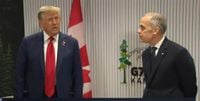US President Donald Trump abruptly left the G7 summit in Canada on the evening of June 16, 2025, amid escalating tensions between Israel and Iran, signaling a sharp shift in global focus from diplomatic trade talks to urgent national security concerns. As he departed, Trump ordered the National Security Council (NSC) to be prepared in the White House Situation Room, underscoring the gravity of the Middle East conflict and the United States' readiness to respond.
Trump's early exit came after what was described as a productive day at the G7, including the signing of a major trade deal with the United Kingdom and Prime Minister Keir Starmer. However, the deteriorating situation in the Middle East compelled the president to cut short his participation. White House Press Secretary Karoline Leavitt confirmed the departure, stating, "President Trump had a great day at the G7, even signing a major trade deal with the United Kingdom and Prime Minister Keir Starmer. Much was accomplished, but because of what's going on in the Middle East, President Trump will be leaving tonight after dinner with Heads of State."
As Trump posed for the traditional "family photo" with other world leaders, he told them, "I have to be back early — for obvious reasons," a statement loaded with implication about the unfolding crisis. Fox News correspondent Lawrence Jones III reported that the president specifically requested the NSC be on standby in the Situation Room upon his return to Washington.
The urgency of the situation was further highlighted by the deployment of additional US military assets to the Middle East. Secretary of Defense Pete Hegseth announced over the weekend that he authorized the deployment of "additional capabilities" to bolster the US defensive posture in the region. Among the reinforcements is the USS Nimitz, one of the largest aircraft carriers in the world, which will operate alongside the USS Carl Vinson, already stationed in the area. Hegseth emphasized, "Protecting US forces is our top priority and these deployments are intended to enhance our defensive posture in the region." In a live Fox News interview, he added, "What you are watching in real time is peace through strength and America First." Despite speculation on social media that the US was assisting Israel with strikes, officials swiftly denied any direct involvement.
Trump's own rhetoric on the crisis has been stark and uncompromising. Throughout the day, he took to his social media platform, Truth Social, to issue a chilling warning: "Everyone should immediately evacuate Tehran!" In multiple posts, he stressed that Iran must not possess nuclear weapons. "Iran should have signed the ‘deal’ I told them to sign," he wrote. "What a shame, and waste of human life. Simply stated, IRAN CAN NOT HAVE A NUCLEAR WEAPON. I said it over and over again!" He reiterated this stance in other posts, declaring, "AMERICA FIRST means many GREAT things, including the fact that, IRAN CAN NOT HAVE A NUCLEAR WEAPON. MAKE AMERICA GREAT AGAIN!!!"
Footage circulating on social media showed masses of people fleeing Tehran, with long queues of traffic as residents attempted to escape what many fear could escalate into open conflict. The Chinese embassy in Israel echoed the sense of urgency, urging its citizens to leave the country via land border crossings as soon as possible. The embassy noted, "At present, the Israeli-Iranian conflict continues to escalate, with civilian facilities damaged and civilian casualties increasing, making the security situation even more severe." Similarly, the Russian embassy advised its nationals to leave Israel until the situation normalizes, with Ambassador Anatoly Viktorov telling state media, "All Russian citizens who are in Israel should leave the country until the situation normalizes." These evacuation warnings reflect the rapidly deteriorating security conditions in the region.
The conflict's immediate impact rippled through global markets, particularly in the cryptocurrency sector. Bitcoin, which had earlier climbed to an intraday high of $108,780, reacted sharply to the news of Trump's early departure and the escalating Middle East tensions. The cryptocurrency shed more than $2,000 within hours, falling 2% to around $106,421 before a slight recovery. Bitcoin has been trading within a range-bound channel since early May 2025, maintaining levels above $100,000, but the recent volatility signals market nervousness.
Ethereum (ETH) experienced even steeper losses, dropping nearly 4.8% in a matter of hours to just above $2,500. Other high-capitalization altcoins suffered declines between 5% and 6%, contributing to a total cryptocurrency market capitalization decrease of approximately $80 billion. Additionally, around $400 million in leveraged positions were liquidated, underscoring the market's heightened volatility amid geopolitical uncertainty.
Trump's strong rhetoric and military movements come against a backdrop of continuing Israeli-Iranian hostilities. Reports emerged of Israeli airstrikes hitting Iranian targets, including an Iranian TV station during a live broadcast in Tehran, footage of which circulated widely on social media. Despite these developments, Trump has asserted that the United States is not directly involved in Israel's attacks. Instead, he has urged Iran and Israel to engage in immediate talks to de-escalate the conflict, stating at the G7 summit, "Iran is not winning this war, and they should talk, and they should talk immediately before it's too late." He pointed to his past diplomatic successes in resolving long-standing conflicts, such as between India and Pakistan, Serbia and Kosovo, and Egypt and Ethiopia, expressing hope for a similar breakthrough in the Middle East. "Likewise, we will have PEACE, soon, between Israel and Iran! Many calls and meetings now taking place. I do a lot, and never get credit for anything, but that’s OK, the PEOPLE understand. MAKE THE MIDDLE EAST GREAT AGAIN!" he proclaimed.
The political fallout from Trump's actions and statements is already evident. Senator Bernie Sanders of Vermont announced legislation aimed at preventing the president from engaging the US in what he called an "illegal war," warning of the devastating human and economic costs another Middle Eastern conflict could entail. "Another war in the Middle East could cost countless lives, waste trillions more dollars, and lead to even more deaths, more conflict, and more displacement," Sanders asserted.
As the G7 summit continues without Trump, with planned meetings including a first-time encounter between the president and Mexican President Claudia Sheinbaum, the world watches anxiously. The focus has shifted from trade and economic cooperation to the urgent need for diplomacy and stability in a volatile region. The coming days will reveal whether the US leadership's preparations in the Situation Room translate into effective measures to contain the conflict or if the Middle East edges closer to a broader confrontation.




